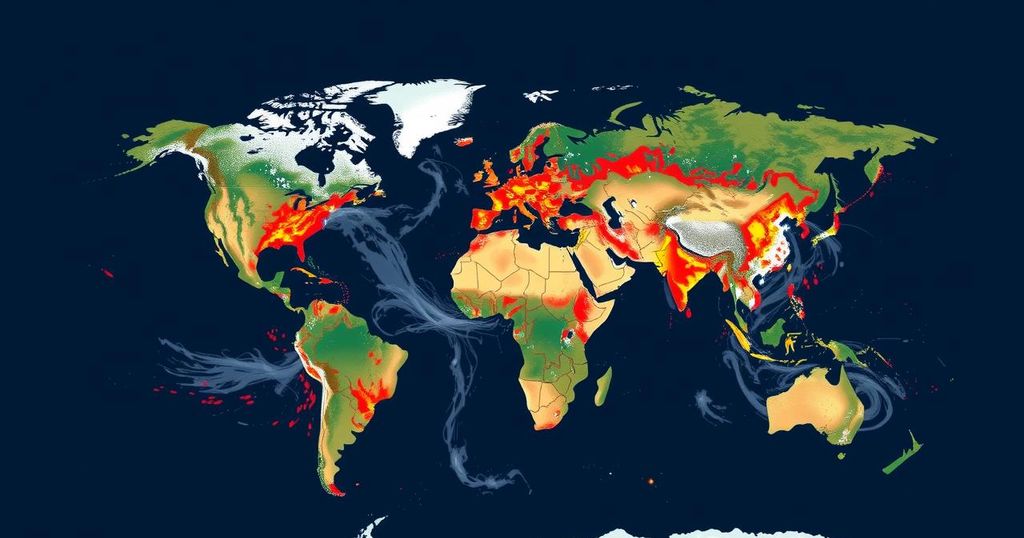Extreme event attribution has revealed that climate change significantly worsens the frequency and severity of extreme weather events globally. A remarkable 74% of nearly 750 analyzed events were found to be influenced by human-induced climate change, while only 9% showed a reduced likelihood or severity. Notable advancements in attribution science, including rapid studies, continue to enhance our understanding of climate impacts, despite disparities in global research representation.
In 2004, researchers marked a significant turning point in climate science by establishing a method to calculate the influence of human-induced climate change on individual extreme weather events. Their analysis of the devastating European heatwave of summer 2003 revealed that climate change had at least doubled the risk of such events. This pivotal study initiated the scientific field of “extreme event attribution,” which assesses the degree to which climate change has impacted the severity, frequency, or consequences of extreme weather phenomena worldwide. The Carbon Brief has since developed a comprehensive interactive map documenting over 600 studies, encompassing nearly 750 extreme weather cases. The findings indicate that 74% of these events were exacerbated by climate change, while 9% were less likely to occur owing to human influence. Notably, in 17% of the events, no human impact was identified or the evidence was inconclusive. The ongoing expansion of attribution studies highlights this growing understanding of climate change’s role in shaping extreme weather occurrences. Among the diverse weather trends recorded, the most common are heat extremes, which constitute over a third of the cases documented so far. Noteworthy instances include the 2019-20 Australian bushfires, attributed to higher weather-induced risks through climate change. Additionally, scientists have recorded significant increases in the frequency and intensity of marine heatwaves over the past four decades, driven by anthropogenic climate change. The method of carrying out attribution studies has evolved considerably since the first study, with the field exploding in the past two decades. The introduction of rapid studies allows researchers to assess the impacts of climate change almost immediately following significant weather events. Organizations such as the World Weather Attribution initiative now provide timely analyses, offering insights into the human contribution to extreme weather shortly after its occurrence. Despite the advances in research, the representation of global extremes in attribution studies remains uneven. The majority of cases are concentrated in developed regions such as North America and Europe, while fewer studies are available for parts of Africa and Asia that experience extreme weather but have less monitoring capacity. Recent years have seen a rise in the number of studies focusing specifically on China following a series of record-breaking climate events, reflecting the dynamic nature of ongoing climate research efforts. In conclusion, the comprehensive mapping of extreme weather events in relation to climate change emphasizes the integral role human activities play in the severity and frequency of these incidents. Continued advancements in attribution science will facilitate a better understanding of climatic impacts, highlighting crucial areas for further research and mitigation.
The article centers on the emerging field of extreme event attribution, a science devoted to quantifying the connection between human-induced climate change and specific extreme weather occurrences. Originating from groundbreaking research in 2004, this area of study has significantly expanded, leading to the development of numerous hard data points illustrating the tangential correlation between climatic shifts and natural disasters. The Carbon Brief’s mapping initiative serves as a prominent platform for disseminating these findings, enhancing global awareness of climate change ramifications. Attribution science assesses events across various dimensions, including heatwaves, droughts, and storms, while also elucidating cases where climate change has mitigated extreme conditions. As attribution studies burgeon, researchers are challenged to confront an uneven data landscape, with a notable concentration of studies emerging from developed regions and fewer representations from less resourced areas. Nevertheless, advances in methodology, such as rapid studies, are rapidly bridging this gap.
The strides made in the field of extreme event attribution are crucial in understanding the human impact on climate-induced weather extremes. The findings from Carbon Brief’s extensive map reveal that a significant majority of recorded extreme weather cases have been worsened due to climate change. The increasing clarity brought to the evaluation of these events urges a proactive response to mitigate climate change’s detrimental effects and emphasizes the necessity for continued investment in global research efforts.
Original Source: www.carbonbrief.org







